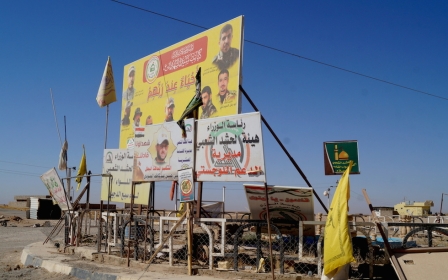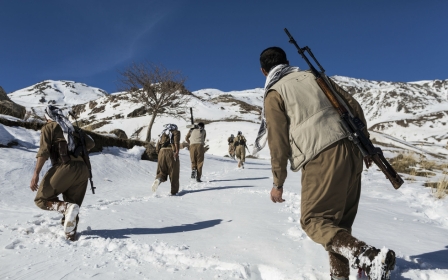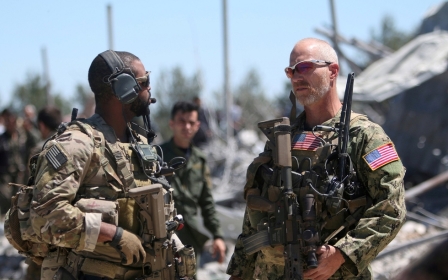Iraqi Kurdish PM calls anger over independence vote 'very normal'
The prime minister of Iraq's autonomous Kurdish region has described the angry regional reaction to an independence referendum as "very normal", even as other Kurdish politicians voice their opposition.
Nechirvan Barzani said the Kurdistan Regional Government (KRG) was unconcerned by condemnation from Baghdad, Turkey and others of a referendum set for 25 September over the region's independence.
"I believe from what we have seen so far, the reactions of the countries are very normal. There is nothing in it that could cause concerns," he said following a meeting of the ruling Kurdish Democratic Party (KDP).
"I believe what has been done so far by the countries is a normal thing. It is not a big reaction."
His comments come in response to an incensed reaction from Turkey, who denounced last week's move to call the referendum as "irresponsible".
Although the KRG is a close ally of Turkey, the latter has long been worried about the effect of an independent Kurdish state on their own restive Kurdish population.
"We have enough problems in our region. We believe it is not correct to create a new area of conflict," Binali Yildirim told reporters on Friday.
"We believe this is a decision that has been made irresponsibly."
In another statement, the Turkish foreign ministry said it was committed to preserving Iraq's territorial integrity and political unity and warned the referendum would "constitute a grave mistake."
Turkey has been engaged in a guerilla war with the Kurdistan Workers Party (PKK) since 1984 which has killed 40,000 people.
I call upon the people of Kurdistan to stand against independence referendum decided by Barzani
- Rabun Maarouf, Gorran MP
Although the PKK is ideologically opposed to the KDP, the biggest party in the Kurdistan Regional Government, Ankara stills fears the ripple effects of Iraqi Kurdish self-determination on its own Kurdish population.
The decision to hold the referendum was taken on Wednesday, during a meeting between KRG President Massoud Barzani and other political leaders.
However, both the anti-corruption Gorran movement and Islamic Group, which combined have 30 seats out of the 111-seat KRG parliament, boycotted the meeting.
On Saturday, Gorran spokesperson Shorsh Haji warned that, while the party supported independence, holding the referendum in September without the support of other parties would be "illegal".
"The issue of referendum should be the last phase of a comprehensive plan before the declaration of the independent state of Kurdistan," Haji said.
"But the process, that the Kurdistan Democratic Party and those who play along [with] its tune has begun, is a party-based and illegal process."
Gorran, which held its first meeting over the weekend since the recent death of the party's iconic leader Nawshirwan Mustafa, has been highly critical of Barzani's leadership and what it sees as an attempt to consolidate his grip on power.
During an appearence on the Kurdish NRT TV channel, Rabun Maarouf, an MP for Gorran, voiced his opposition to the referendum and called for "the people of Kurdistan to stand against independence referendum decided by Barzani."
Read more: Iraqi Kurdish independence: Looming on the horizon?
A senior Kurdish official, Hoshiyar Zebari, told Reuters in April that a referendum would be held this year to press the case for "the best deal" on self-determination once the Islamic State group is defeated in Iraq.
Baghdad has also rejected the legitimacy of the unilateral referendum call.
"No party can on its own decide the fate of Iraq, in isolation from the other parties," government spokesman Saad al-Hadithi said in a statement on Friday.
"Iraq is constitutionally a democratic, federal country with full sovereignty. Any measure from any side in Iraq should be based on the constitution.''
The exact areas which would be included in a future Kurdish state have been a subject of major controversy. A tweet from Barzani's assistant, Hemin Hawrami, on Wednesday appeared to include a number of disputed territories, including the highly volatile Kirkuk and Sinjar regions, in the referendum:
Sinjar has seen repeated clashes between forces loyal to the KRG and forces linked to the PKK. Kirkuk, which has major cultural significance for Kurds, has been hit by repeated controversies, including over the raising of the Kurdistan flag on government buildings.
Abdulla Hawaz, an analyst studying the Kurdish region of Iraq, said that holding the referendum could be rife with difficulty.
"I think the referendum as agreed by the KDP and the Patriotic Union of Kurdistan (PUK), the two ruling parties, will take place, but the challenge would be holding it in the disputed territories since, as local media has reported, the referendum may take place in the disputed territories like Kirkuk as well," he told Middle East Eye.
He said, however, that he expected the majority of Iraqi Kurdistan to vote for independence, although that didn't necessarily mean it would become a reality.
"I think the majority will vote yes, but I'm not sure if that is the only measure for success," he said.
"I would rather consider it successful if the independence actually happened - either gradually or directly after the referendum."
The KRG has been hard hit in recent years by the rise of the Islamic State group. Since 2014, a loss of funds from the central government in Baghdad and the need to boost security and absorb more than a million refugees has led to increasing instability and growing authoritarianism from the KDP.
Middle East Eye propose une couverture et une analyse indépendantes et incomparables du Moyen-Orient, de l’Afrique du Nord et d’autres régions du monde. Pour en savoir plus sur la reprise de ce contenu et les frais qui s’appliquent, veuillez remplir ce formulaire [en anglais]. Pour en savoir plus sur MEE, cliquez ici [en anglais].




